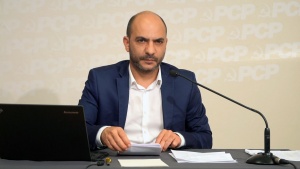1 - It is necessary to continue to respond to the serious public health problem that the country faces, namely with preventive measures and the enlargement of the capacity of response by the National Health Service. But it is also urgent to respond to the fast deterioration of the economic and social situation, namely the set of problems that are today posed to thousands of micro, small and medium-size entrepreneurs who constitute more than 99% of the Portuguese economic fabric.
The reality that has been developing and gathering on the ground since mid-March is overwhelming. There are tens of thousands of companies that have suspended their activity. In some cases, due to the prevention and combat measures themselves, in others, due to the breakdown of orders, the breakdown of supplies of goods and intermediate services, or the absence of domestic or foreign demand. Thousands of companies no longer have any revenues, maintaining, however, the main part of their fiscal and contributory obligations, of their responsibilities with the wages of their workers, as well as other costs, ranging from energy to the cost of their premises, including insurance, water, telecommunications, accounting and other services.
The reality in many sectors, from catering to accommodation, from the textile industry to building industry, from hairdressers and barber shops to gyms, from taxis to individual passenger transport, from retail businesses to car repairs, from street vendors to farmers and fishermen, from art and performing arts to the providers of accounting services, among others, confirms the need for a strong and vigorous response.
2- The measures adopted by the government are limited and insufficient, essentially aimed at safeguarding large and some medium-sized companies. Measures that boil down to subsidised credit lines (with the banks as consultants and the corresponding and severe constraints of access), the deferral of terms and payments of fiscal obligations and the simplified Lay-off, with what this means of cuts in wages of workers, as well as the exclusion of a large group of companies, managing partners and the burden on Social Security that the government estimates at around 1000 million euros for every month in which the contingency measures are in force.
Measures that do not take into account the Portuguese economic fabric. That forget their high degree of dependency and frailty and also their informal dimension, that ignore the fact that thousands of companies do not have relevant share capital or reserves to face the current situation, that exclude from support companies that have unsolved contributory situations and bank incidents. If other measures are not adopted, thousands of MSMEs will go bankrupt, fuelling the strategy of capitalist concentration and centralisation.
3 - The PCP has stated that the primary response to the economic and social consequences of measures to prevent and combat the epidemic outbreak of Covid-19 is the need to prevent redundancies and guarantee the payment of full wages to workers.
An option that bears in mind the importance of keeping the domestic market and the purchasing capacity of Portuguese workers and people alive, whether in the present or when the epidemic outbreak is over and which assumes that it is essential to ensure that the country's economy continues to function as normally as possible. An option that must articulate with the need to defend and expand national production.
An option that requires a radical change in the intervention of banks, which, in the current situation, have real possibilities to assume their role in financing the economy, but whose control by monopoly groups, prevents this from taking place. It is necessary to ensure that, in this situation, there is no distribution of dividends to shareholders, but that, in itself, is insufficient. What is really needed is that banks play a role focused on stimulating economic activity and promoting its development.
4- For the PCP, it is necessary to adopt and urgently implement measures that respond to two concrete realities:
To begin with to the reality of family-owned micro-enterprises and self-employed businessmen, self-employed workers, many with casual situations, living on various partial jobs, paid on commission, engaged in proximity services (from construction and cleaning, to beauticians and tutors, hairdressers, taxi drivers, vendors, professionals in the performing arts, among others). This requires:
a) Ensuring an income supplement assessed according to the previous income (present in the Social Security quarterly statements), proportional to the losses incurred by closure or loss of partial/fulltime job, up to a maximum value of three times the National Minimum Wage - NMW (if there is no income in 2019, the value of one NMW must be considered);
b) Providing an interest-free credit line (proportional to revenue losses, up to a maximum of 12 NMW) with State guarantee, 2-year grace period and 10-year amortisation, to ensure working capital to face various costs;
c) Granting bank moratoriums on the payment of instalments for the purchase of instruments/means or workplace;
d) Creation of a Public Fund to Support the Treasury of micro-entrepreneurs and self-employed businessmen supported by the State Budget and with the use of EU funds, to support the expenses of advanced support. The definition of the maximum amount to be made available per company will take into account the number of jobs and the business volume.
And on the other hand, measures for other small entrepreneurs, aimed at:
a) Ensuring an immediate response to guarantee full payment of wages to workers in companies whose activity is suspended, creating specific mechanisms, including a Fund for that purpose, with financial means to be made available by the State Budget;
b) Adapting the current credit lines created by the government, ensuring promptness and a minimum liquidity to the treasuries without representing an untenable future burden for the survival of these companies, ensuring:
- Credit at zero interest rate, with 10-year repayments, guaranteed by the State, creating a Guarantee Fund for this purpose;
- The existence of bank incidents and/or situations of non-compliance with Social Security and the Tax Authorities cannot be a factor for the exclusion of these supports (as long as there is an ongoing negotiation or claim for the settlement of debts submitted by April 30), and 5% of the credit granted will aim to settle this type of situation. Access to these credits should also be guaranteed to companies created less than 12 months ago.
c) In terms of taxation, in addition to the postponement of deadlines already in place, ensure that: in 2020 no pre-payment will be made regarding IRC Income Tax (not even the moratoriums decided by the government); the State must also accelerate the refund of VAT (for which confirmation by a certified accountant will suffice) and IRC due to companies, as well as Income Tax, in the case of self-employed businessmen.
d) With regard to managers and managing partners with contributory careers for Social Security, move forward with the application of the regime foreseen for self-employed workers with the reinforcement of the respective amounts and the extension of access conditions.
e) The government must speed up the application of Decree Law 12/2003 to ensure the social support established for all micro and small entrepreneurs with contributory careers who, in the current framework, have been forced to permanently close their activity;
f) It must be allowed to activate moratoriums on debts to the State, establishing adequate deadlines for their future reimbursement, and payment and credit moratoriums must be ensured with the banking sector, namely, arising from loans or leases contracted for investments in means of production and labour;
g) MSMEs should have the right to suspend energy supply and telecommunications contracts - even those of customer loyalty - and benefit from the exemption of associated fees, without added costs before or after the resumption of activities;
Other aspects of public aid to micro and small companies should also be considered:
- Streamlining mechanisms of contact and intervention with MSMEs, and their representative associations, empowering the structures of the Ministry of Economy (namely within the scope of IAPMEI) and the Ministry of Social Security.
- Stimulate all public investment that was underway, preventing the stoppage of public works and projects, either by the Central Government or by the Local Government.
- Accelerate the payment of State debts to companies, giving priority to MSMEs, alongside the redefinition of criteria for State acquisitions in several areas, giving priority to the replacement of imports by domestic production and contracting with these companies.
- Intervene to reduce the prices of fuel and electricity, as well as in sectors, whose specificity requires another type of consideration, such as agriculture, fisheries, or transport.
5 - The rapid deterioration of the economic and social situation, the absence of a time horizon for the end of the epidemic outbreak, together with the structural weaknesses of the economic fabric and the insufficiency of government measures, raise apprehension, concern and even legitimate despair among thousands of businessmen.
The health emergency situation, but also the economic and social emergency, requires exceptional measures that go far beyond the responses that the government has been putting forward.
Measures and options that require a break with the budgetary limitations and constraints and with the class options that underlie the right-wing policy that is common to the PS Government, as well as PSD, CDS and substitute parties.
As we all are aware, the resources are not unlimited, that is why they need to be used, not to defend the profits and privileges of large economic groups, but to protect the income of workers, pensioners, MSMEs and ensure the production material of goods and services and rendering of services that respond, at this stage, to the country's needs.
The situation requires the State to intervene with the utmost topicality directly in banks and other strategic companies for the Portuguese economy, with the necessary regulation and price fixing, the mobilisation of huge public resources to ensure income and dynamism of economic activity.
MSMEs are not a problem for the country, but an essential instrument to respond to the recovery of national economic activity.
The country needs the workers and their productive strength, much of it stopped at this moment, to overcome the current situation. But it also needs micro, small and medium-sized entrepreneurs, and their companies, to respond to the problems of the present and prepare for a future that begins tomorrow.
This, as in other critical moments of national life, makes very clear how much Portugal needs another policy, and another course, a patriotic and left-wing policy that, in this case, does not leave behind any MPME.




